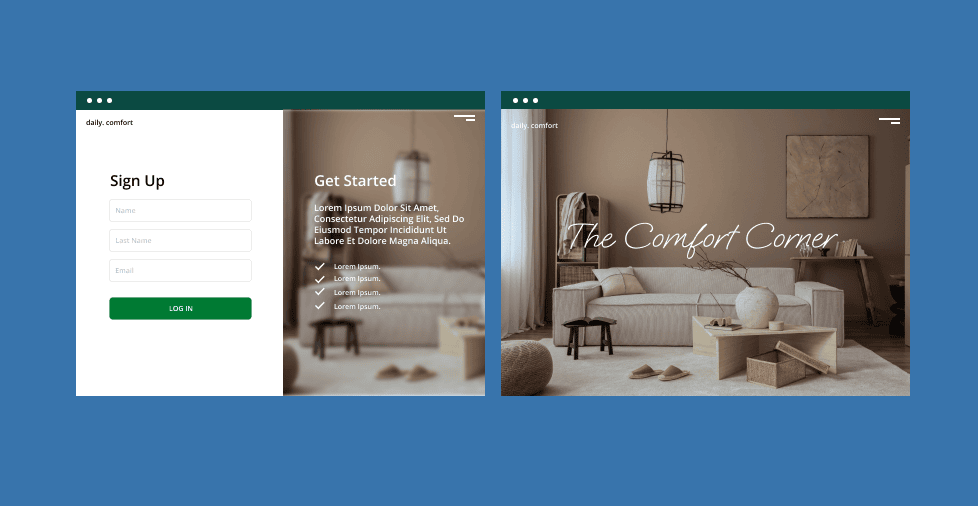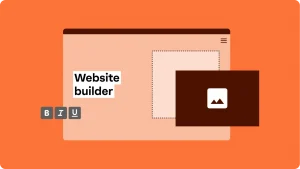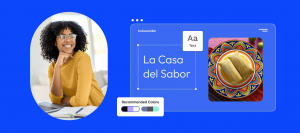Key takeaways:
- A website is your foundation for establishing your online presence and showcasing multiple products or services.
- Landing pages are ideal for driving conversions. They are designed to minimize distractions and guide visitors toward a single, clear call to action (CTA).
- Websites offer long-term search engine optimization (SEO) benefits and are key for content marketing.
When building your online presence, you’ll likely encounter a nagging but straightforward question: Should you create a whole website or just a landing page? Mixing the two up is easy, and many business owners wonder which one they need. Both can be effective, but they serve different goals and shine in various situations.
In this article, we’ll discuss the main differences between a landing page and a website, when to use each, and how they affect your marketing and SEO efforts. We’ll also clear up common questions so you can confidently move forward, knowing which option best fits your business.
What is a landing page?
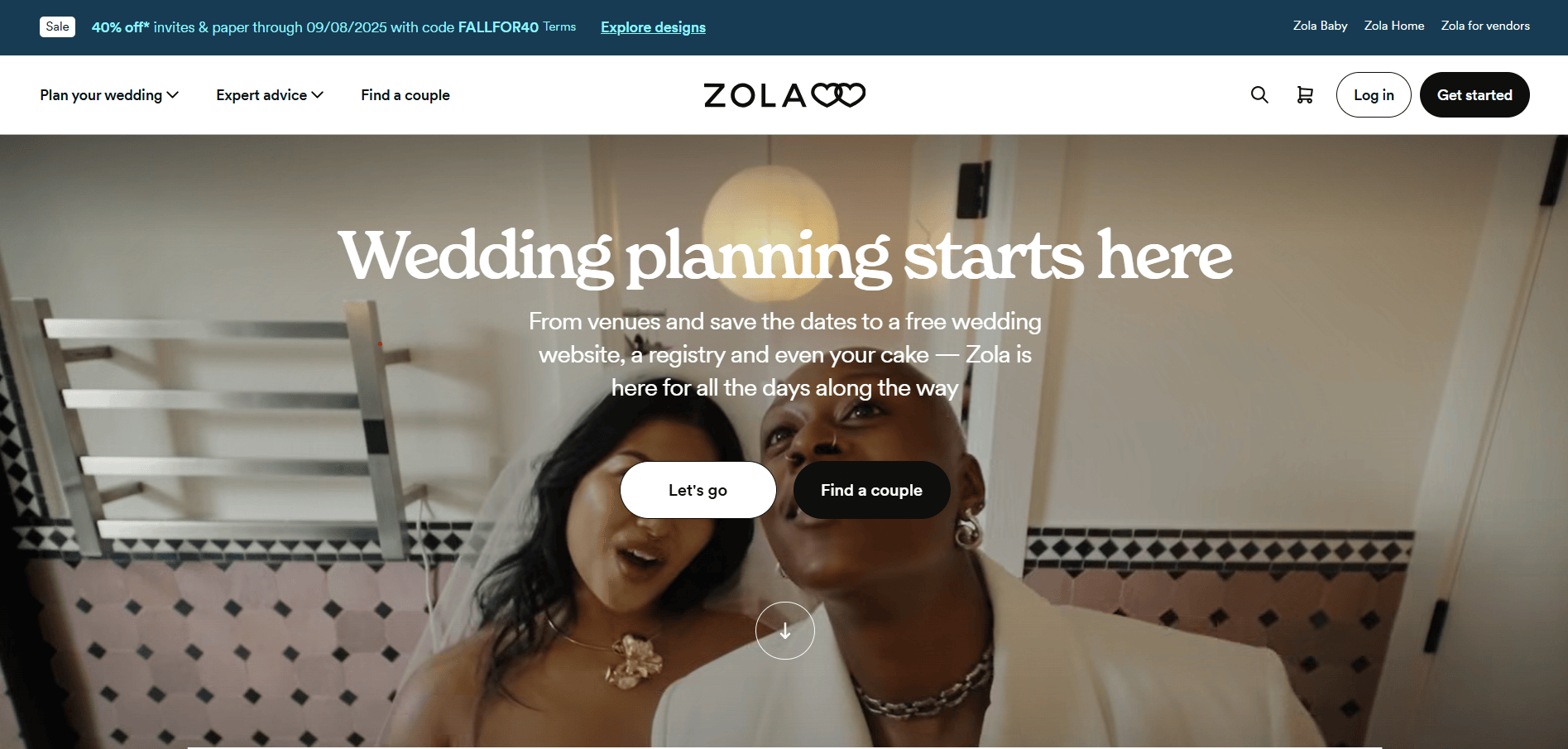
(Image source: https://www.zola.com/)
A landing page is a single webpage with one clear purpose: to get visitors to take a specific action. That action might be purchasing a product, signing up for a service, or downloading a free eBook. Every element on the page, from the headline to the button, is designed to guide people toward that goal.
The name comes from how people arrive there. After clicking on a link from a social post, email, or ad, visitors “land” on the page. It spotlights the offer and the message that urges visitors to take action. That focus makes landing pages so effective for marketing campaigns, promotions, and lead generation.
Note: There are specific use cases that warrant single-page websites, but they inherently differ from landing pages in terms of purpose.
Key components of an effective landing page
A landing page is only as good as the elements that drive it. To ensure your landing page converts, make sure you include these essential components:
- Clear and concise headline. Your headline should immediately grab attention and communicate the core offer.
- Compelling sub-headline. Follow the headline with a brief sub-headline that further elaborates on the offer and its value.
- Strong call-to-action. Make your CTA clear, direct, and actionable. Use phrases like “Get Your Free eBook,” “Sign Up Now,” or “Claim Your Offer.”
- Value proposition. Explain what visitors will gain from your offer. The proposition should focus on solving a problem or fulfilling a need.
- Visuals. Use relevant, high-quality images or videos to support your message and make the page visually appealing.
- Social proof. Include testimonials, reviews, or trust badges to build credibility and reassure visitors.
- Simple, clean design. The layout should focus attention on the CTA, with minimal distractions. Keep it clean and easy to navigate.
- Contact form. For lead generation, ensure the form is simple and only requires essential information.
What is a website?
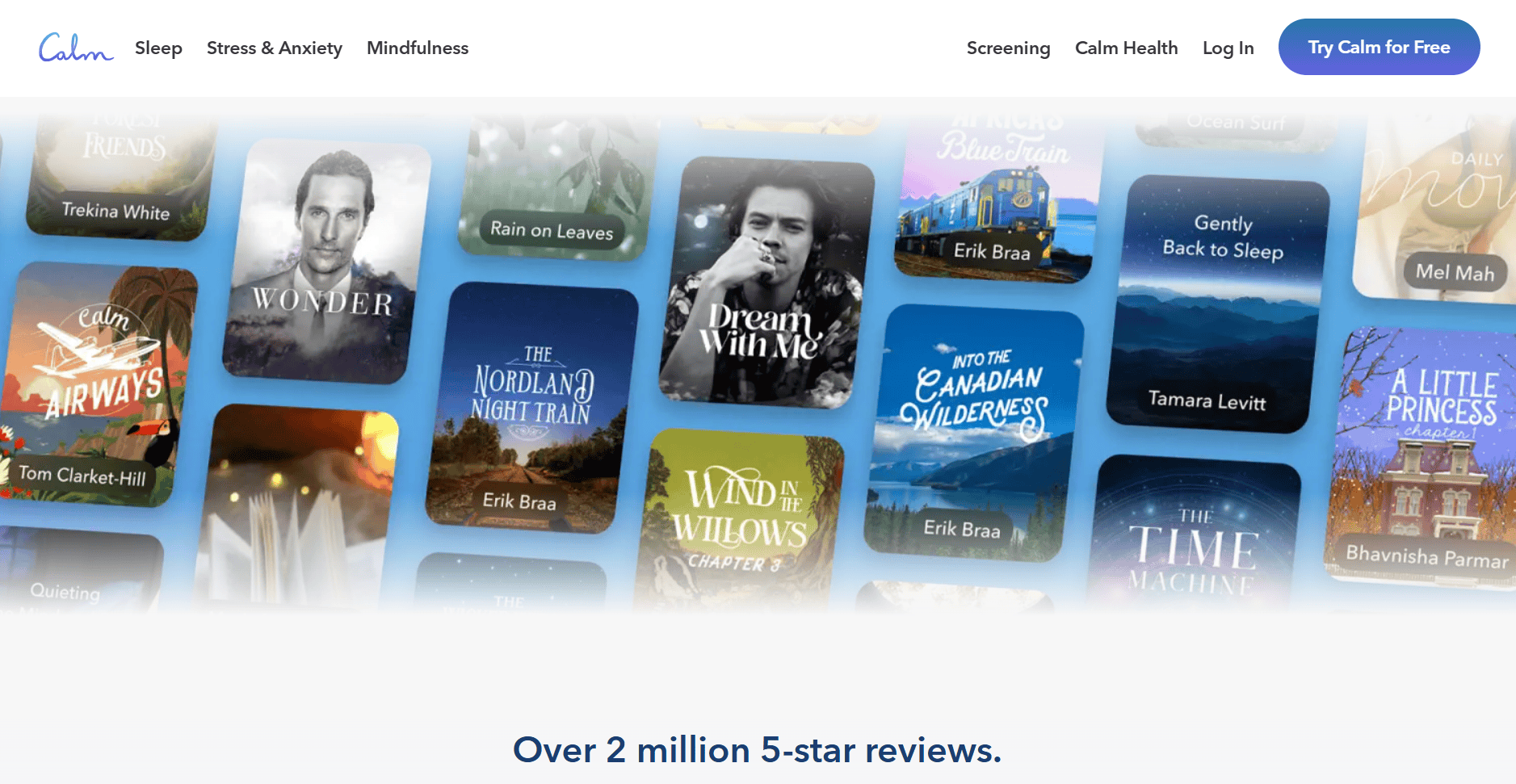
(Image source: https://www.calm.com/)
While a landing page is built for a specific action, a website, on the other hand, is built for the bigger picture. It’s a collection of connected pages under one domain, designed to showcase your business from different angles.
Visitors can browse your services, read your blog, learn more about your company, and contact you through your contact form all in one place.
Unlike a landing page, a website isn’t tied to a single campaign or promotion. It serves as your online dwelling where you build credibility, share your brand story, and give people multiple ways to engage with you. For most businesses, a website becomes the foundation of their digital presence.
Landing page vs. website
A landing page and a website seem similar at first glance—they both live on the web and can attract visitors. But you see the differences clearly as you look closely. Knowing these differences will help you decide which one fits your business goals.
| Feature | Website | Landing page |
| Purpose | Builds your brand, showcases your business, and offers multiple ways for visitors to connect | Focuses on conversions like sign-ups, downloads, or sales |
| Structure | Multi-page, with different sections like homepage, about, services, blog | Single page, designed around one clear message |
| Navigation | Open, with menus and links to guide visitors across the site | Zero to minimal, often no menu, to focus attention on the call-to-action |
| SEO potential | Broad reach with multiple keywords and long-term ranking opportunities | Narrow, usually optimized for one campaign or offer |
| Lifespan | Long-term | Usually short-term, tied to campaigns or promotions’ duration |
A website gives your business a permanent home, while a landing page gives you a powerful tool for specific campaigns. Many companies see the best results when they use both strategically.
When should you use a website vs. a landing page?
So, when should you use each one? It depends on your goals. In this next section, we’ll examine the scenarios where a website or landing page makes the most sense for your business needs.
When to use a website
A website is ideal for situations where you need to showcase your brand, build credibility, and provide visitors with multiple ways to interact with you.
Here are some use cases for when you should invest in a full website:
- Brand building. If you’re a new business or looking to establish a long-term brand presence, a website allows you to tell your story, show your mission, and display your values.
- eCommerce platforms. Websites are useful for eCommerce businesses. They as a platform to showcase your offerings, organize them into categories, and provide comprehensive information such as descriptions, prices, and customer reviews. The website’s navigational nature makes it easier for customers to browse and make purchasing decisions.
- Content marketing. A website lets you house your content in one place—blogs, guides, and a knowledge base. It helps you build authority and connect with your audience in the long run.
- Establishing credibility. A website offers you a solid space to build your credibility through reviews and customer testimonials.

When to use a landing page
If you only want to convert visitors during a marketing or advertising campaign, use a landing page instead of creating an entire website. A single web page minimizes distractions and focuses the users’ attention on the message you are promoting or the actions you want them to take. Landing pages often deliver results when collecting leads, promoting a special offer, or driving sales.
Here’s a closer look at when to lean into landing pages:
- Running ad campaigns. Landing pages are perfect for paid ads. From Google or Facebook Ads, you can direct visitors to a page built specifically for the offer in the ad.
- Product launches. When launching a new product or service, a landing page allows you to focus on the key details—product benefits, pricing, and the CTA, all in one place without distractions.
- Lead generation. If your goal is to collect leads through emails or other contact information, a landing page keeps the focus on that specific action.
- Special promotions. A landing page lets you create urgency for limited-time discounts or offers by highlighting the deal, driving immediate action without the clutter of other elements in a multi-page website.
- Event registration. If you’re hosting a webinar, conference, or any other event, landing pages provide an easy, single-action experience for people to register. This ensures a streamlined process for event sign-ups.
When to use both
A website serves as the long-term foundation for your brand, while landing pages provide powerful tools for specific, short-term goals. Combining both a landing page and website allows you to drive traffic to targeted offers and promotions while maintaining a solid online presence.
Here are some real-world examples of how businesses use both:
- eCommerce stores. An eCommerce website creates a landing page for a special holiday sale, directing traffic from ads to that specific offer and helping drive immediate sales.
- Software companies. A software as a service (SaaS) company uses its website to showcase product features, reviews, and pricing. It then creates a landing page to promote a free trial offer, directing ad traffic to that page with a single CTA to encourage sign-ups.
- Event promoters. A company running an annual conference builds a website with multiple pages for the event, providing details such as schedules, speakers, and venue information. They launch a landing page specifically for early bird ticket sales during the registration period.
Landing page vs. full website: What works best for your business?
Each industry has distinct online needs, and understanding your business goals is integral to choosing the right option. Knowing whether a landing page or a complete website aligns with your objectives can help you make a smarter decision.
Here’s a look at which option works best for different types of businesses based on their specific goals:
eCommerce
Website. A website is important for eCommerce sites selling multiple products or services. It allows you to showcase your offerings effectively.
Landing page. When running a campaign, use a landing page. You can optimize it to direct visitors to the deal, creating urgency and streamlining the purchase process.
Professional services
Website. Professionals need a website to establish credibility and provide information on their services. It also offers a space for potential clients to reach out, book consultations, or learn more about your expertise.
Landing page. Landing pages are a great way to promote free consultations or a specific service. You can design them to drive one action, such as signing up or making an inquiry, which is effective for generating leads.
Startups
Website. As a startup, you need a website to introduce your brand, products, and services. A website gives you a foundation to scale your business and helps you build long-term relationships with your audience.
Landing page. Landing pages are perfect for building anticipation for a product launch or gathering early sign-ups for a beta test. They allow you to engage with your target audience and collect data before a full-scale launch.
Local businesses
Website. Local businesses benefit from having a website that provides information like location, services, operating hours, and contact details. A website also helps your business appear in local search results.
Landing page. A landing page is a great way to spotlight specific deals during limited-time promotions or special events. A clear call-to-action helps visitors take action immediately, such as booking an appointment or making a reservation.
Event planning
Website. For large events, a full website offers detailed schedules, speaker profiles, registration forms, and event information. It serves as a hub for information leading up to the event date.
Landing page. Landing pages are highly effective when promoting early bird ticket sales or special event packages. They streamline the registration process, focus on the key message, and encourage quick sign-ups.
SEO and marketing impacts of websites vs. landing pages
Websites are built for long-term online growth and broader visibility. A website’s multi-page structure allows businesses to target various keywords, create valuable content, and build domain authority over time. Websites are ideal for content marketing and building a loyal audience.
In contrast, landing pages focus on a specific goal and are often used for short-term campaigns. While they don’t offer the same broad SEO benefits as websites, they excel at driving conversions by targeting a single call to action. Landing pages work well with targeted marketing campaigns.
Turn your goals into reality with the right online strategy
Websites are important for building your brand and growing your online business. Landing pages are ideal for short-term goals that yield campaign-focused results. Understanding when to use each can help you develop your online presence for immediate and lasting success.
If you’re ready to create a website that effectively serves your business goals, Network Solutions’ AI Website Builder is perfect for you. It offers a streamlined process for building a site that stands out using AI-powered tools.

Frequently asked questions
While your website can technically function as a landing page, it’s not optimized for that purpose. A website’s navigation menus can distract visitors from the primary goal of a landing page. Instead, create landing pages, which can still be part of your website structure, that are designed with a singular focus. This will ensure your visitors stay on track and are directed toward the specific action you want them to take.
It depends on your primary objective. A website is important if you want to establish a long-term online presence, build credibility, and offer multiple products or services. A dedicated landing page is highly effective for short-term campaigns, but it’s not designed to serve as the foundation of your online presence.
Absolutely! Many websites include landing pages for specific campaigns. These pages are often linked from the website and offer a focused experience for visitors to take action, like signing up or making a purchase.
